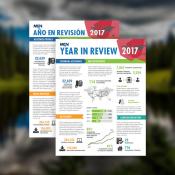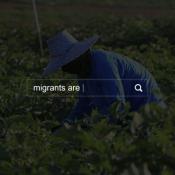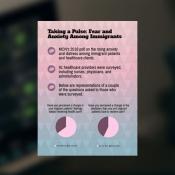- Who We Are
- Clinician Employment
- Publications
- Witness to Witness (W2W)
- Kugel & Zuroweste Health Justice Award
- Your Voice Matters: Photovoice Project

How many times a year does Migrant Clinicians Network provide expert on-site and distance technical assistance? How many mobile patients were provided with bridge case management through Health Network? What percentage of MCN training participants found the information provided useful to their work? The MCN blog has dozens of stories, case studies, and in-the-field updates to demonstrate... Read More

April 7th is World Health Day, and we’re celebrating by doubling down on our Five on Friday recommendations -- with two reading recommendations from each staff member! Despite the dizzying speed of the news cycle in these troubling times, we recognize that an informed and motivated clinical network can make lasting change. Help us stay informed as well -- send us your reading... Read More

[Editor’s Note: Congratulations, Monique, Health Network Intern, from UT Austin Steve Hicks School of Social Work! Her poster presentation on Health Network was accepted at the Latino Social Workers Organization Conference. Here, she reflects on the conference and her work as an intern and social worker.][Editor’s Note: Congratulations, Monique, Health Network Intern, from UT Austin Steve... Read More

MCN’s ECHO Diabetes series drew attention from health centers throughout the United States, with participation from twenty-two community health workers who represented ten health centers and programs from east to west. These included Community Health Partnership of Illinois, Hospital General Castañer in Puerto Rico, Clínica Msr. Oscar A. Romero and Clínica Comunitaria de Vista, both in... Read More

Farmworkers deserve protection from pesticides: Defend important regulations and take part in National Farmworker Awareness Week #NFAW2018
Farmworkers face substantial health risks at their jobs, including exposure to pesticides. At Migrant Clinicians Network, we have spent decades fighting for a stronger Worker Protection Standard, and in 2015, a revised WPS laid out significant increases in protections -- an important win for farmworker health, although the revised WPS lacked important provisions like medical... Read More

Type “Migrants are...” in your search bar and and you’ll see what your browsing history guesses you believe. “Migrants are scum, migrants are invaders, migrants are ruining Europe,” pop up on one browser, whereas, when I’m signed in, Google -- which knows me a little better -- says “migrants are our neighbors” and “migrants are here to stay” -- perhaps not any less controversial, but a bit... Read More

Spring has sprung! The first day of spring -- earlier this week on March 20th -- is also celebrated as National Ag Day. Right now in California, lettuces and asparagus are ready to be picked, while across the Upper Midwest and East, many fields will again get tucked under snow this weekend. Tens of thousands of migrant workers toil on our nation’s fields, moving as the fields respond... Read More

In the fifth session of our Project ECHO on diabetes, MCN facilitated talks with experts on self-management for diabetes. This ECHO series aims to share tools and tactics, help community health workers at health centers learn about the most recent research, and make a space for networking, to support health centers in their efforts to bring down HbA1c numbers around the country. This series... Read More

In our current political environment, it is downright impossible to keep up with the news. Here’s our weekly list of health justice-related articles and resources that perhaps you’ve missed as the news cycle wrings us out like a high-efficiency washing machine. In what ways do you keep informed, without getting overwhelmed? Let us know your strategies on our Five on Friday post on social... Read More

“I find that my patients are living under constant fear and stress. They express to me that they no longer feel safe or welcomed in their communities. Many families are becoming more isolated and their lives are confined to work and home. They are less likely to be engaged in their communities and this is leading to higher levels of stress and anxiety, which is exacerbating their other... Read More




